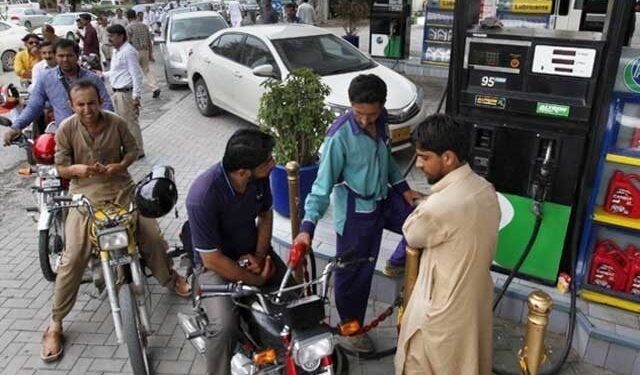Islamabad: In a significant move that is expected to impact consumers across the board, the federal government of Pakistan has announced a sharp increase in the prices of petroleum products. According to a notification issued by the Finance Division, the revised prices will be applicable from July 16, 2025, and will remain in effect for the next 15 days, in line with the country’s fortnightly price revision mechanism.
The decision comes on the recommendation of the Oil and Gas Regulatory Authority (OGRA) and the Ministries of Energy and Finance, following a review of international oil prices and the rupee-dollar exchange rate.
Details of the Revised Petroleum Prices
The notification outlines significant changes in the prices of petrol and high-speed diesel (HSD), while kerosene oil and light diesel oil (LDO) have seen a minor reduction. The revised prices are as follows:
Petrol Price Increase
- Previous Price: Rs 266.79 per liter
- New Price: Rs 272.15 per liter
- Increase: Rs 5.36 per liter
High-Speed Diesel (HSD) Price Increase
- Previous Price: Rs 272.98 per liter
- New Price: Rs 284.35 per liter
- Increase: Rs 11.37 per liter
Kerosene Price Decrease
- Previous Price: Rs 180.29 per liter
- New Price: Rs 177.19 per liter
- Decrease: Rs 3.10 per liter
Light Diesel Oil (LDO) Price Decrease
- Previous Price: Rs 165.75 per liter
- New Price: Rs 163.90 per liter
- Decrease: Rs 1.85 per liter
The sharp rise in the prices of petrol and diesel is expected to have a direct and indirect impact on the cost of transportation, goods, services, and overall inflation in the coming weeks.
Why the Prices Have Been Increased?
The government attributed the price revision to a combination of factors:
1. International Crude Oil Prices
Global oil prices have seen volatility due to geopolitical tensions, production decisions by OPEC+, and rising demand during summer months. Brent crude, which serves as a benchmark for international oil prices, has hovered around $85 per barrel, increasing the import cost for petroleum products.
2. Exchange Rate Volatility
The Pakistani Rupee has remained under pressure against the U.S. dollar, raising the effective cost of petroleum imports. A weaker rupee means the government pays more in local currency to purchase oil priced in dollars.
3. Adjustment of Petroleum Levy and Sales Tax
To meet fiscal targets agreed with the International Monetary Fund (IMF), the government is also believed to have adjusted petroleum levy rates, although no formal confirmation has been provided in the latest notification. The Petroleum Levy (PL) is a major source of revenue for the federal government.
Implications for the Public and Economy
Increased Cost of Transportation
An increase in petrol and diesel prices directly affects the cost of public and private transportation, particularly in urban centers where daily commuting is a necessity. Transporters often pass on the burden to passengers through higher fares, adding to the daily cost of living.
Inflationary Pressure
Diesel is widely used in the agriculture and goods transportation sectors, so an increase in its price leads to a ripple effect on food prices, construction materials, and retail products. Pakistan is already facing double-digit inflation, and this hike is expected to push inflation figures even higher.
Impact on Farmers and Industrial Sector
Farmers who rely on diesel-powered machinery will bear higher operational costs, while industries dependent on fuel-driven logistics will face increased input costs, possibly affecting production and exports.
Public Reaction and Political Fallout
The sharp price increase has sparked criticism from consumer rights groups, transport unions, and opposition parties, who have accused the government of failing to shield citizens from the burden of global price shocks.
Public Concerns
Citizens across various cities expressed concern over the rising cost of living. Many described the petroleum price hike as a “new economic burden” on the middle and lower-income segments of society. “We are already struggling with inflated grocery bills, and now transportation will become even more expensive,” said a commuter in Lahore.
Political Criticism
Opposition leaders have labeled the increase as “anti-people”, urging the government to explore alternative ways of raising revenue instead of burdening the masses. Some have demanded the reduction of petroleum levies and taxes to offer relief.
Government’s Response and Justification
Officials in the Ministry of Finance defended the decision by saying the government has limited fiscal space, especially after the recent IMF bailout deal, which includes commitments to increase revenue and reduce subsidies.
A senior official said, “While we understand the concerns of the public, these price adjustments are necessary to prevent a widening fiscal deficit. The government is doing its best to minimize the impact through targeted subsidies and social protection programs.”
Background: Pakistan’s Petroleum Pricing Mechanism
Pakistan follows a fortnightly pricing system for petroleum products, under which OGRA recommends price changes based on global oil trends, exchange rate fluctuations, and domestic tax adjustments. The final decision is made by the Finance Division, which issues a notification every two weeks.
In recent years, this mechanism has come under scrutiny, with demands for greater transparency in price calculations. Experts have also urged the government to reduce reliance on imported fuel by diversifying energy sources and investing in renewable energy infrastructure.
Possible Relief Measures
While no immediate relief has been announced, the government has hinted at the following initiatives:
- Targeted fuel subsidies for low-income households and public transport operators.
- Expansion of cash assistance programs like BISP (Benazir Income Support Programme) to help vulnerable communities manage rising costs.
- Promotion of energy conservation through public awareness campaigns and incentives for fuel-efficient vehicles.
Future Outlook: Will Prices Continue to Rise?
Analysts believe that if international oil prices remain high and the rupee continues to weaken, further increases in petroleum product prices are likely in the next review. However, a stable exchange rate and declining global oil prices could provide temporary relief in the months ahead.
Energy economist Dr. Khalid Saeed stated, “Unless we address structural inefficiencies in our energy procurement and pricing system, Pakistani consumers will remain vulnerable to global price shocks.”
Conclusion: A Challenging Time for Consumers and Policymakers
The July 16 petroleum price hike is a reminder of the delicate balance the government must strike between fiscal responsibility and public affordability. While global oil market conditions are largely beyond its control, the need for effective domestic policies, transparency, and long-term energy reforms has never been more urgent.
As the new prices take effect, households, businesses, and transporters will feel the pressure—and all eyes will be on how the government manages the economic fallout while maintaining public trust.

























